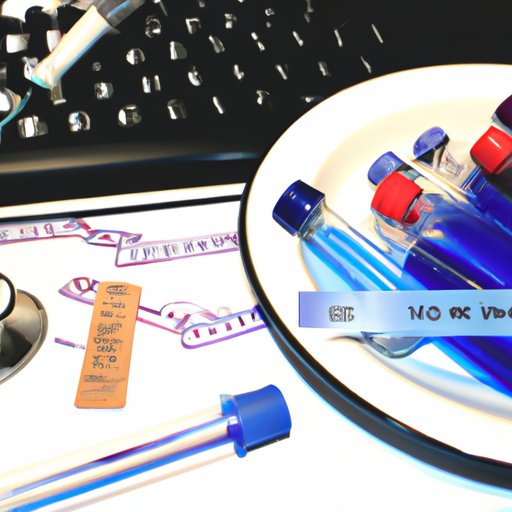Introduction
A biomedical science degree is an undergraduate or postgraduate qualification that covers the study of biology and medicine. It focuses on understanding the body’s structure and functions, as well as exploring diseases and their treatments. With this degree, you can pursue a variety of career paths, from lab technician to medical researcher. In this article, we’ll explore the job opportunities available to biomedical science graduates and provide tips for making the most of your degree.

Exploring the Career Paths Available to Biomedical Science Graduates
Biomedical science degrees open up a range of job opportunities. Depending on your interests and experience, you may be able to find a role in one of the following fields:
- Lab Technician
- Medical Researcher
- Clinical Laboratory Scientist
- Biomedical Engineer
- Physician Assistant
What’s Possible? Examining the Roles and Responsibilities of Biomedical Science Professionals
Let’s take a closer look at what each of these positions entail.
Lab Technician
Lab technicians work in a laboratory setting, conducting experiments and tests to analyze tissue samples and other biological materials. They document their findings and report their results to scientists, doctors, and other healthcare professionals. Lab technicians must have excellent attention to detail and be familiar with standard laboratory protocols and safety procedures.
Medical Researcher
Medical researchers conduct research to develop new treatments and therapies for illnesses and diseases. They also study existing treatments to determine their effectiveness. Medical researchers often work in teams, collaborating with other scientists and healthcare workers to develop new drugs and therapies. They must be highly organized and analytical, with strong communication and problem-solving skills.
Clinical Laboratory Scientist
Clinical laboratory scientists are responsible for analyzing patient samples and performing laboratory tests. They must be familiar with laboratory equipment and techniques and have a good understanding of medical terminology. Clinical laboratory scientists must have excellent interpersonal skills, as they often interact with patients and other healthcare professionals.
Biomedical Engineer
Biomedical engineers use engineering principles to design and create medical devices and equipment. They must have an understanding of anatomy, physiology, and physics, as well as a working knowledge of computer programming. Biomedical engineers must be creative and have excellent problem-solving skills.
Physician Assistant
Physician assistants work closely with doctors to diagnose and treat patients. They are responsible for taking medical histories, performing physical exams, and ordering tests. Physician assistants must be compassionate and have strong communication skills, as they often interact directly with patients.
The Salaries and Demand for Biomedical Science Graduates
According to the United States Bureau of Labor Statistics (BLS), the median annual salary for biomedical science professionals varies depending on the position. The median salary for a lab technician is $41,070, while a medical researcher earns a median salary of $62,670. Clinical laboratory scientists earn a median salary of $52,330, while biomedical engineers make a median salary of $88,550 per year. Physician assistants make a median salary of $108,610 annually.
Demand for biomedical science professionals is expected to increase over the next decade. The BLS projects that employment of lab technicians will grow by 5 percent between 2019 and 2029, while medical researchers can expect to see a 5 percent growth in employment during the same period. Clinical laboratory scientists will see a 5 percent growth in employment, while biomedical engineers are expected to see a 4 percent growth in employment. Physician assistants will experience a much faster rate of growth, with a 28 percent increase in employment projected between 2019 and 2029.

From Lab Technicians to Medical Researchers: An Overview of Jobs in the Biomedical Science Field
No matter which job path you choose, there are certain skills and qualifications you’ll need to have to be successful in the biomedical science field. Let’s take a look at some of the common job duties, education and training requirements, and specializations within the field.
Job Duties
Biomedical science professionals perform a wide range of tasks, from collecting and analyzing data to developing treatments and therapies. Specific job duties vary from position to position, but generally speaking, biomedical science professionals are responsible for conducting experiments, analyzing results, and reporting their findings to other healthcare professionals. They may also be responsible for designing and creating medical devices and equipment.
Education & Training
Most biomedical science professionals need to have a bachelor’s degree in biomedical science or a related field, such as biology or chemistry. Some positions may require a master’s degree or higher. Additionally, many positions require additional training and certification, such as a license to practice medicine or a clinical laboratory scientist certification.
Specializations
Within the biomedical science field, there are several areas of specialization, such as biochemistry, immunology, genetics, and microbiology. Each area of specialization requires specific knowledge and skills, so it’s important to research the different options before deciding which one is best for you.

How to Make the Most of Your Biomedical Science Degree: Tips for Jobseekers
If you’re looking for a job in the biomedical science field, there are a few things you can do to increase your chances of success. Here are a few tips to help you get started:
Networking
Networking is one of the best ways to find job opportunities in the biomedical science field. Attend professional conferences and join industry organizations to meet potential employers and learn about available jobs. You can also use social media platforms like LinkedIn to connect with other professionals in the field.
Honing Your Skills
Keep up with the latest developments in the biomedical science field by reading industry publications and attending seminars and workshops. Doing so will help you stay up to date on the latest trends, technologies, and techniques in the field.
Getting Experience
Gain experience in the biomedical science field by volunteering or interning at a research lab or hospital. This will give you the opportunity to gain hands-on experience and develop the skills needed for the job.
Finding a Mentor
Find someone who is already working in the field and ask them to mentor you. A mentor can provide invaluable advice and guidance as you navigate the job search process.
Conclusion
A biomedical science degree opens up a range of job opportunities, from lab technician to medical researcher. To make the most of your degree, it’s important to network, hone your skills, gain experience, and find a mentor. With the right preparation, you can find a rewarding career in the biomedical science field.
(Note: Is this article not meeting your expectations? Do you have knowledge or insights to share? Unlock new opportunities and expand your reach by joining our authors team. Click Registration to join us and share your expertise with our readers.)
